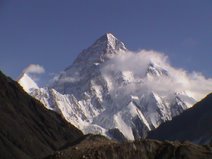Issue 49 Volume 04, May 26 - June 01, 2005
There seems to be no end to Musharraf's controversial rule. His appetite for power remains unlimited and his desire to flout the democratic traditions has no confines
Syed Farooq Hasnat
On May 18, 2005 the Pakistani official spokesman said that General Pervez Musharraf would continue to hold office beyond 2007. With this statement there seems to be no end to Musharraf's controversial rule. His appetite for power remains unlimited and his desire to flout the democratic traditions of Pakistan has no confines. His only rationale to be in power is his self-proclaimed indispensability against international terrorism. He sends the message that the forces of extremism would take over Pakistan, more so its nuclear assets, once he is out of power. In fact it's just the opposite, as illegal control would in fact encourage militancy in Pakistan. It would undermine the genuine national political parties and would inculcate a culture of distrust and greed. All these factors taken together would further weaken not strengthen the Pakistani society.
As witnessed in Afghanistan, unstable societies are a hotbed for extremist tendencies. The new world order presented a value system, according to which the human rights and democratic institutions were to be encouraged and enforced.
By the end of the last century it became unthinkable that in countries where democratic institutions were in place could follow any other path. The emphasis was on the strengthening of the institutions; its rollback was not conceived. On 12th October 1999, Pakistan became an exception when its military took over power, sacked the elected Prime Minister (no matter how controversial he was), dissolved the National and Provincial assemblies and suspended the constitution. This was the fourth time that the army had intervened, through martial law, although this time it was not declared as such. The promised takings of the post-coup regime were stereotypes, such as a promise of free and fair elections, bringing true democracy in the country and eradication of corruption. It was an echo of the previous military dictatorships of General Ayub Khan, General Yahya Khan and General Ziaul Haq.
Soon after his takeover, addressing a press conference, General Musharraf affirmed that he would remain in office for not more than three years. Since 1958, the direct military rule in Pakistan is spread for about three decades. From 1985 to 1988 General Ziaul Haq installed a civilian Prime Minister, but kept the powers in his office, by grossly amending the 1973 Constitution. After the death of General Zia, a political process started as a result of 1988 elections, with an expectation that future Pakistan would move towards a civil society. For nearly 11 years (1988-1999) Pakistan Muslim League, under Nawaz Sharif and the Pakistan People's Party led by Benazir Bhutto alternately shared power. Within the mainstream politics, for the first time, a two party system emerged, promising that it would provide a kind of political stability that was not seen before - although, both the leaders could not use their authority to strengthen the institutions, political or otherwise. These governments lacked seriousness of purpose and agendas for the future. Their commitment to the welfare of the people was weak and the matters that affected the real lives of the people were never addressed. Whenever the opportunity arose, these two leaders would jump to cooperate with the military establishment. In fact, when in opposition they would send feelers to the Commander-in-Chief to intervene. The civilian governments failed to allow a democratic culture to take its roots in the polity of Pakistan.
However, in spite of all its flaws, the political process was captivating the foundations of a democratic culture. More so, the participation of the people was being reflected, in one way or the other. It was believed that uninterrupted political process would ultimately bring a civil society in place and that Pakistan would get rid of the menace of military takeovers. The frail political governments were not all that meek. The military interference was challenged from time to time and measures were taken to take command of the armed forces. One of the fragile Prime Ministers, Muhammad Khan Junejo, boldly challenged the corruption and non-professionalism within the armed forces. Just before his ouster, apart from other acts to curtail the ambitious generals, he had ordered an inquiry into the Ojheri weaponry site blast of April 10, 1988, which was suspected to be masterminded by an army general. Prime Minister Nawaz Sharif on October 8, 1998 removed the Amy Chief General Jehangir Karamat for his interference in politics and a naval chief was dismissed on corruption charges. No matter Nawaz Sharif wanted to clip the wings of the Generals to enhance his personal power, but these actions fit well in explaining a delicate balance between the military and the civilian authority - where ultimately the civilian governments lost the battle for control.On its part, the military sat on the fences, putting pressures on at least three main concerns of Pakistan, namely the nuclear issue, the Kashmir issue and the Afghanistan issue. The military pushed the weak political governments to accommodate the retired Generals at key civilian positions, severely compromising the efficiency of the national institutions. Apart from that the military got increasingly involved in taking control of the economic institutions of the country, their corporate interests got more expanded with every new opportunity. With that the stories of corruption and nepotism became a household talk.
Immediately after the coup, Army Chief General Pervez Musharraf held a one-and-a-half-hour meeting with the Ambassador of the United States, William B. Milam, which, according to some sources, was described as 'good'. It was quoted that the American Ambassador gave a patient hearing to the military ruler and, heard with interest his agenda to solve Pakistan's unresolved issues. It was known that General Pervez Musharraf wanted to get a nod from the United States, which was the sole super power, with ability to influence the world/regional events. General Musharraf's legitimacy as a military ruler, could not come from the people of Pakistan and he understood that well.
Anxious as he was, the General was desperate to legitimise his rule by whatever means. Like his predecessor General Ziaul Haq, General Musharraf in 2002 undertook to legitimise his rule by holding a national referendum. Like General Zia, the system could not gain legitimacy by the law of necessity doctrine alone, so generously applied by the highest court in Pakistan. The referendum question was: "For the survival of the local government system, establishment of democracy, continuity of reforms, end to sectarianism and extremism, and to fulfill the vision of Quaid-e-Azam, would you like to elect President General Pervez Musharraf as President of Pakistan for five years?" A number of people reportedly cared to vote but the General declared himself as the President for the next five years. Interestingly, later the General admitted that the referendum was flawed but he would still keep his post for the next five years. The Washington Post in its editorial of April 12, 2002 had suggested that the Bush administration's support for the General in holding a referendum would be a mistake, unless he is willing to "work within a legitimate democratic system". But political expediency overcame all other values. Even today, the question of legitimacy is grave for the President. In spite of the inherent flaws in the procedure, at the eve of that legitimising exercise, a number of questions were raised. It was argued that, "the referendum results could be termed authentic only if the next elected parliament and the provincial assemblies validate them. Secondly, the President must not amend the constitution unnecessarily. Thirdly, the newly elected President must not manipulate the forthcoming general elections. Fourthly, once his election is validated by the newly-elected legislatures, General Musharraf should retire as the Chief of Army Staff." On all accounts, the General failed to fulfill any of the conditions and thus even after three years, questions about his legitimacy as a head of the State and government remain on the horizon.By the first quarter of 2005, the Pakistani society had become a hallmark of misrule, as widespread corruption and mediocre became the standard norm.
At the macro level the issues of the legitimacy of the regime and sovereignty of the nation remains the two main concerns for the people of Pakistan. A unanimous view exists that under the repeated military interventions, the Pakistani society has grossly worsened and help is needed in all fields. A renowned Pakistani Professor noted that the national "politics has been reduced to a mere game of chess and with the exception of rare voices in the wilderness, transcendental principles have no relevance in statecraft". He further adds "…for all the claims of realism and pragmatism, the problems of an economy in shambles, law and order in disarray and education in tatters, and not addressed. Politics has fallen into disrepute because the practitioners of realpolitik do not appear to have a clear vision of the chronic ills of our society. In the realm of thought, we are going in the dark".
The Pakistani society today is a sad picture of the collapse of all institutions and a widespread degeneration in the society. People have been led to shortcuts, greed, and other illegal means, thus paving ways for incompetence and corruption. Nearly every programme that was launched by the military government, failed to achieve its goals, education being the major victim.Pakistan represents more of a society resembling a medieval rule, with a resemblance of the dark ages of the Muslim civilisation, than a modern Islamic nation with well-established structures of a civil society. Professor Stephen Cohen remarks, "If he (General Musharraf) resembles any past Pakistani leader, it is General Yahya Khan - also a well-intentioned general who did the United States a great service". The professor further hinted that Musharraf has rented his country to the more powerful states. General Musharraf gets his legitimacy from outside as he fails to get from the people of Pakistan.
The writer is former Chairman and Professor, Department of Political Science, Punjab University. He settled in the US after serving the Punjab University for 28 years. He is Adjunct Scholar at Middle East Institute, Washington, D.C.
Email: Hasnatf1@yahoo.com


